If you’re questioning, ‘Should you contact an attorney after a golf cart accident?’ the answer is straightforward: It’s a wise choice. Legal representation can be vital due to the potential complexities and consequences of the golf cart accident depends above. This article will guide you through the benefits of consulting an attorney, ensuring you make an informed decision about your next steps after a golf cart accident.
Key Takeaways
- Consulting an attorney post-golf cart accident is critical for navigating the legal complexities, evaluating appropriate compensation for incurred losses, and negotiating effectively with insurance companies.
- Common causes of golf cart accidents include driver negligence, mechanical failures, and hazardous course conditions, which can result in significant physical injuries and liability concerns.
- Attorneys play an instrumental role in establishing liability, collecting evidence, utilizing expert testimonies, and managing settlement negotiations or litigation to build a strong case for clients affected by golf cart accidents.
Why You Should Consider Contacting an Attorney After a Golf Cart Accident
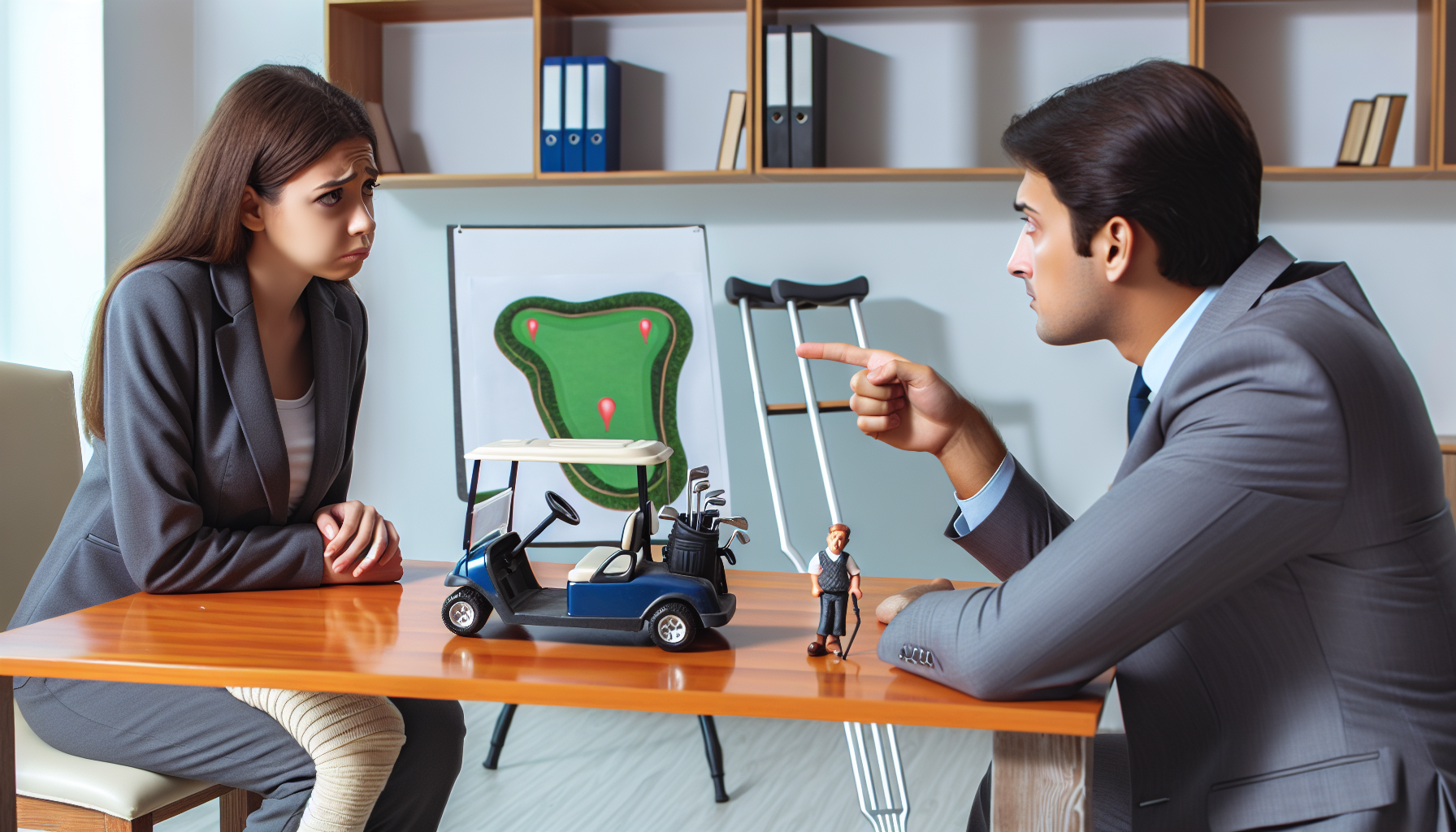
If you’ve been involved in a golf cart accident, you might be wondering if you need an attorney. The answer is a resounding yes. Legal advice can be invaluable in such circumstances, offering guidance through the complex maze of laws, procedures, and paperwork that follow such incidents. An experienced attorney here can help you understand your rights, assess your case, and provide much-needed support during this trying time.
An experienced personal injury attorney can aid in assessing suitable compensation for serious injuries by considering factors such as:
- injuries
- medical expenses
- lost wages
- pain and suffering
- personal injury claim
- personal injury lawsuit
They can also engage in negotiations with the insurance company to secure equitable compensation, thereby alleviating you from the complexities of navigating the claims procedures.
Legal Expertise and Guidance
An attorney’s legal expertise can be instrumental in navigating golf cart accident cases. Their assistance can clarify the golf cart accident laws specific to traffic laws in your state, help identify the responsible party, and facilitate recovery of medical bills and other damages.
Understanding the relevant laws enables an experienced personal injury attorney to adeptly manage golf cart accident cases. This understanding same traffic laws informs the legal strategy and enables the attorney to hold the responsible party accountable. Therefore, having an attorney on your side is more than just a recommendation, it’s a necessity.
Compensation Evaluation
In golf cart accidents, evaluating appropriate compensation is a key aspect. An attorney can guide you in determining the compensation owed for:
- severe injuries
- medical expenses
- lost wages
- pain and suffering
in such cases.
An attorney can assess suitable compensation by taking into account the severity of injuries, medical costs, lost income, overall impact on the victim’s quality of life, and the physical and emotional distress suffered. The process typically involves gathering evidence, determining the extent of damages, and negotiating with insurance companies.
Insurance Negotiations
Insurance negotiations can be a daunting task, especially when you are trying to recover from a golf cart accident. Here is where an attorney can step in and make a significant difference. Attorneys are instrumental in negotiating fair compensation with insurance companies for victims of golf cart accidents via personal injury claims.
A personal injury attorney can help you in the following ways if you are involved in a car accident golf cart accident:
- Identify all insurance policies that pertain to injuries in the accident, facilitating your pursuit of compensation.
- Help you seek reparation from the owner’s liability insurance if the accident was a result of the owner’s actions.
- Navigate the complex world of insurance claims, ensuring that you get the compensation you deserve.
Common Causes of Golf Cart Accidents
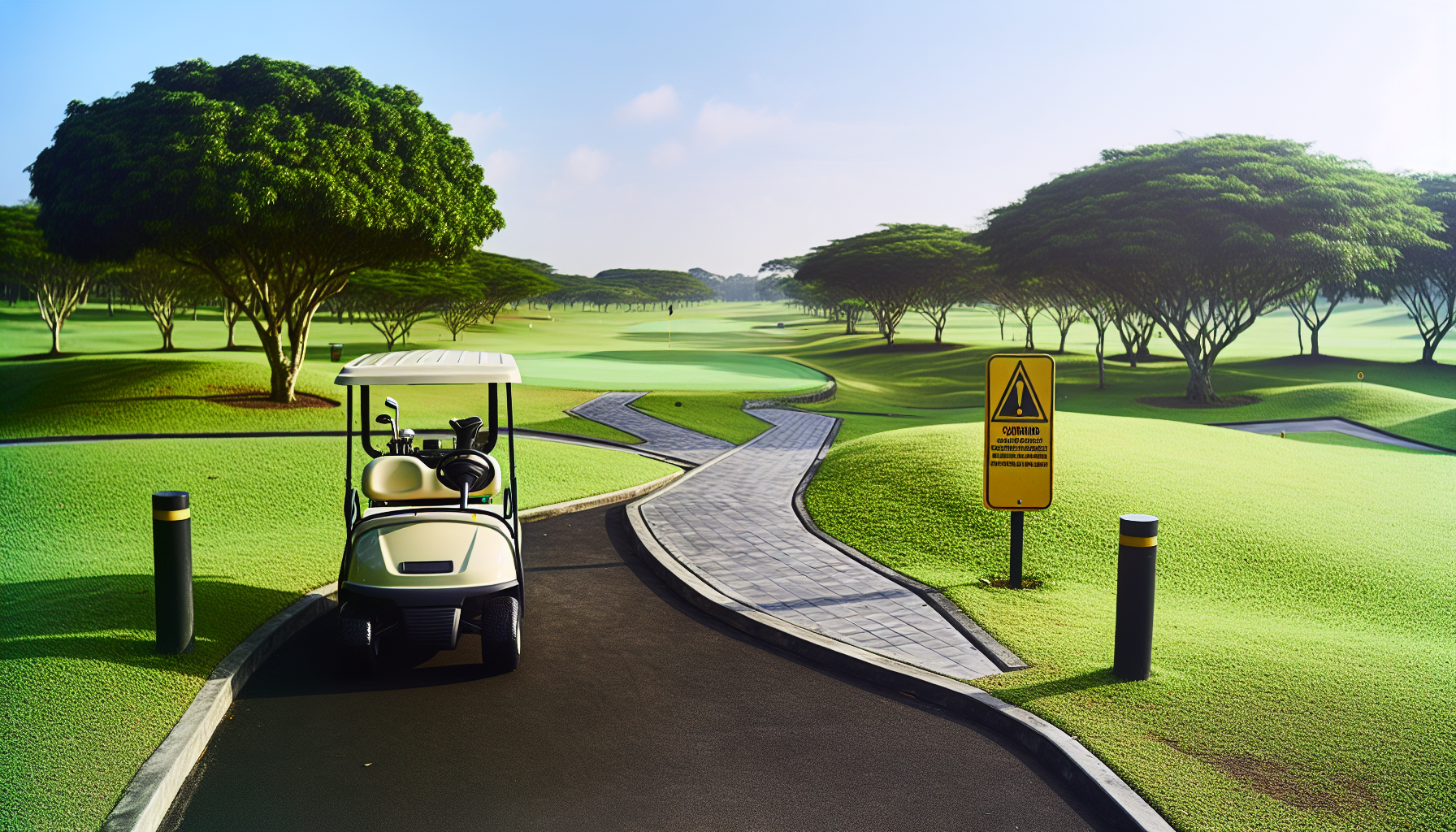
While golf carts are generally safe, accidents can and do occur. Understanding the common causes of these accidents can help prevent them from happening. Three typical factors contributing to golf cart accidents are driver negligence, mechanical failures, and hazardous course conditions.
Each of these factors can have significant impacts on the safety of golf cart operation. Understanding these causes allows us to take preventative measures, mitigating their risks and thereby reducing golf cart accidents. We will now examine each of these causes and their implications in more detail.
Driver Negligence
One of the most common causes of golf cart accidents is driver negligence. Reckless driving or driving under the influence can result in golf cart accidents, which the police report are categorically seen as negligence by golf cart drivers.
Speeding, making sharp turns without caution, and operating the cart while intoxicated are typical examples of reckless driving behaviors that often result in golf cart accidents. Alcohol or drug use can have a significant impact on coordination, reaction time, and overall physical abilities, thereby increasing the likelihood of causing a golf cart accident.
The statistics indicate that over 15,000 injuries and approximately 600 deaths occur annually in the United States due to golf cart accidents caused by reckless driving.
Mechanical Failures
Mechanical failures, such as faulty brakes or steering, can also lead to golf cart accidents. These failures can result in sudden movements that lead to falls, and the open design of golf carts, absence of seatbelts, inadequate braking capabilities, and uneven terrains can contribute to these failures.
A defective brake system can result in brake failures, impeding the golf cart from stopping or decelerating as necessary, thereby increasing the likelihood of accidents. Similarly, a malfunction in the steering system can compromise the cart’s maneuverability, resulting in a potential loss of steering control and thereby endangering the safety of the driver and passengers. In such cases, manufacturers can be held accountable for accidents if they stem from mechanical failures like defective brakes or steering mechanisms.
Hazardous Course Conditions
Hazardous course conditions can also contribute to golf cart accidents. This includes inadequately maintained paths or obstacles that may lead to golf cart accidents on a golf course.
Examples of hazardous course conditions include poorly maintained paths that may be uneven or have potholes, and obstacles that might impede the safe operation of golf carts. In such cases, golf courses owners can be held liable for accidents resulting from hazardous course conditions as they are responsible for ensuring the safety of their property for patrons.
Types of Injuries Sustained in Golf Cart Accidents
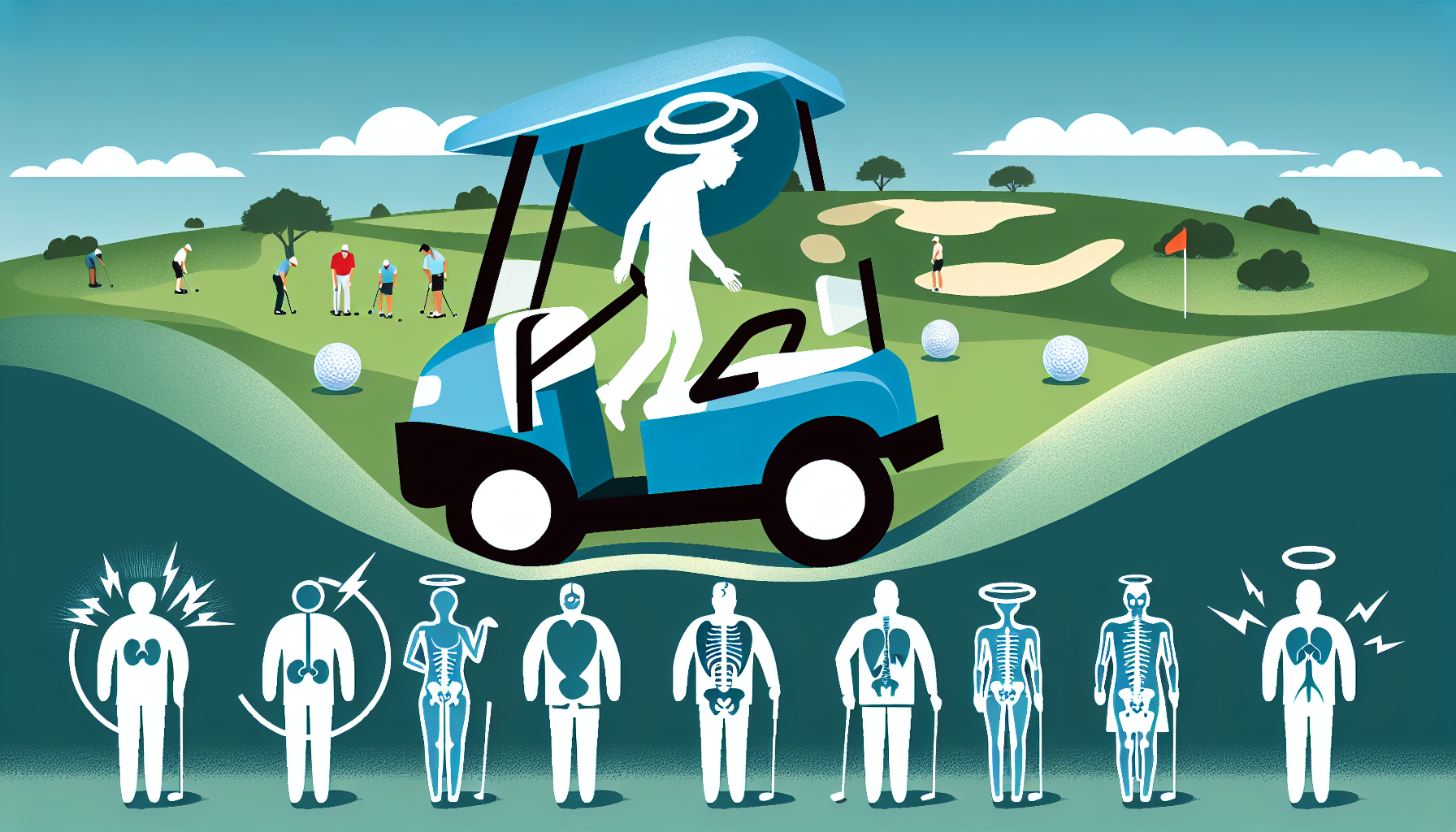
While golf carts might seem less dangerous than traditional motor vehicles, accidents involving them can lead to severe injuries. From head and neck and traumatic brain injuries, to broken bones and soft tissue injuries, golf cart accidents can result in a variety of physical harm.
It’s vital to know the types of injuries that can arise from golf cart accidents. This awareness not only highlights the seriousness of such incidents but also provides victims with a clearer understanding of their injuries’ potential impact and the necessity for prompt medical care and suitable legal action.
Head and Neck Injuries
One of the most common types of injuries sustained in golf cart accidents are:
- Head injuries
- Neck injuries
- Mild concussions
- Severe head injuries
- Fractures
- Dislocations
The prevalence of head and neck injuries in golf cart accidents can be attributed primarily to the absence of safety features cover golf carts, such as seat belts or airbags, that are standard in most motor vehicles. Treatment for these injuries may encompass medical care for conditions such as:
- broken bones
- lacerations
- concussions
- whiplash
Preventive measures recommended include:
- Outfitting golf carts with seat belts, brake lights, and indicators
- Exercising prudence while driving
- Refraining from risky behavior
- Avoiding overloading
- Remaining vigilant of the surroundings.
Broken Bones and Fractures
Broken bones and fractures are another common occurrence in golf cart accidents. Particularly in cases of high-speed collisions or rollovers, there is a risk of passengers being ejected, which may lead to limb crush or bone fractures as a result of being thrown out of the golf cart crash itself.
The typical recovery period for fractures and broken bones resulting from golf cart accidents usually suffered injuries that varies from six to eight weeks, with the duration dependent on the seriousness of the injury. This underlines the gravity of such accidents and the potential long-term impact they can have on the victims.
Soft Tissue Injuries
Soft tissue injuries, such as sprains and strains, are also common in golf cart accidents. These injuries might not be as visible as head injuries or fractures but can cause significant discomfort and require extensive medical treatment.
Sprains and strains are examples of soft tissue injuries that may arise from golf cart accidents. These injuries are usually diagnosed by a skilled orthopedic physician, who can also provide appropriate treatment recommendations.
Establishing Liability in Golf Cart Accidents
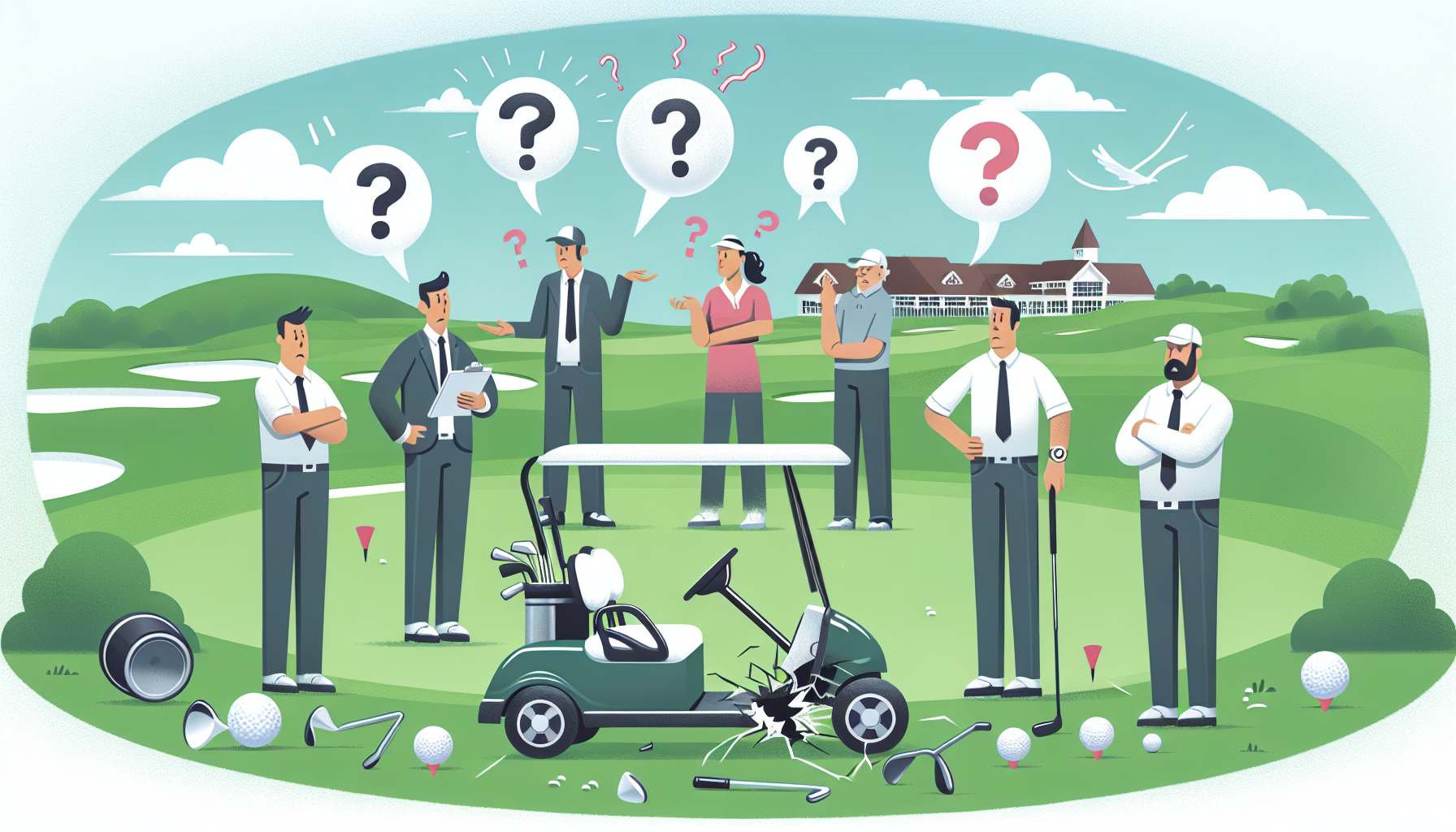
In a golf cart accident, assigning liability is a key aspect of the legal process. This involves pinpointing the responsibility of the drivers, golf course owners, and manufacturers implicated in the accident.
This process can be complex, considering the various elements and parties involved. Understanding how liability is established can provide clarity and help guide the legal process in the event of a golf cart accident.
Driver Responsibility
A golf cart driver can be held responsible for their actions that lead to an accident. This includes reckless behaviors such as speeding, making sharp turns without caution, and operating the golf cart injuries or while under the influence of alcohol or drugs.
In the event that the cart was being operated recklessly by a minor without a driver’s license, it is possible for a parent or guardian to be held accountable. Ultimately, the driver themselves is often held financially responsible for the injuries or losses caused by their negligent or reckless behavior.
Golf Course Owner Liability
Golf course owners can also be held liable for accidents on their property. This falls under the legal concept of premises liability, which holds property owners responsible for any accidents or injuries that occur on their property due to hazardous conditions.
For instance, if the state of the course or its carts is determined to be hazardous, resulting in an accident attributable to these unsafe conditions, the golf course owner could be deemed liable. This underscores the importance of golf course owners maintaining their property in a safe condition to prevent potential accidents and legal ramifications.
Manufacturer Liability
Manufacturers of golf carts can be held liable for design flaws or manufacturing defects that contribute to golf cart accidents. These defects can range from faulty brakes or steering mechanisms to inherent flaws in the design that make the carts unsafe.
Typical manufacturing defects found in golf carts encompass problems such as:
- Failed batteries
- Solenoid issues
- Ignition failures
- Worn tires
- Motor burnout
- Faulty switches
- Speed control problems
In order to hold a golf cart manufacturer accountable for an accident, it may be necessary to establish that they distributed a hazardous or flawed product, typically by demonstrating negligence, strict liability, or breach of warranty of fitness.
How an Attorney Can Help Build a Strong Case
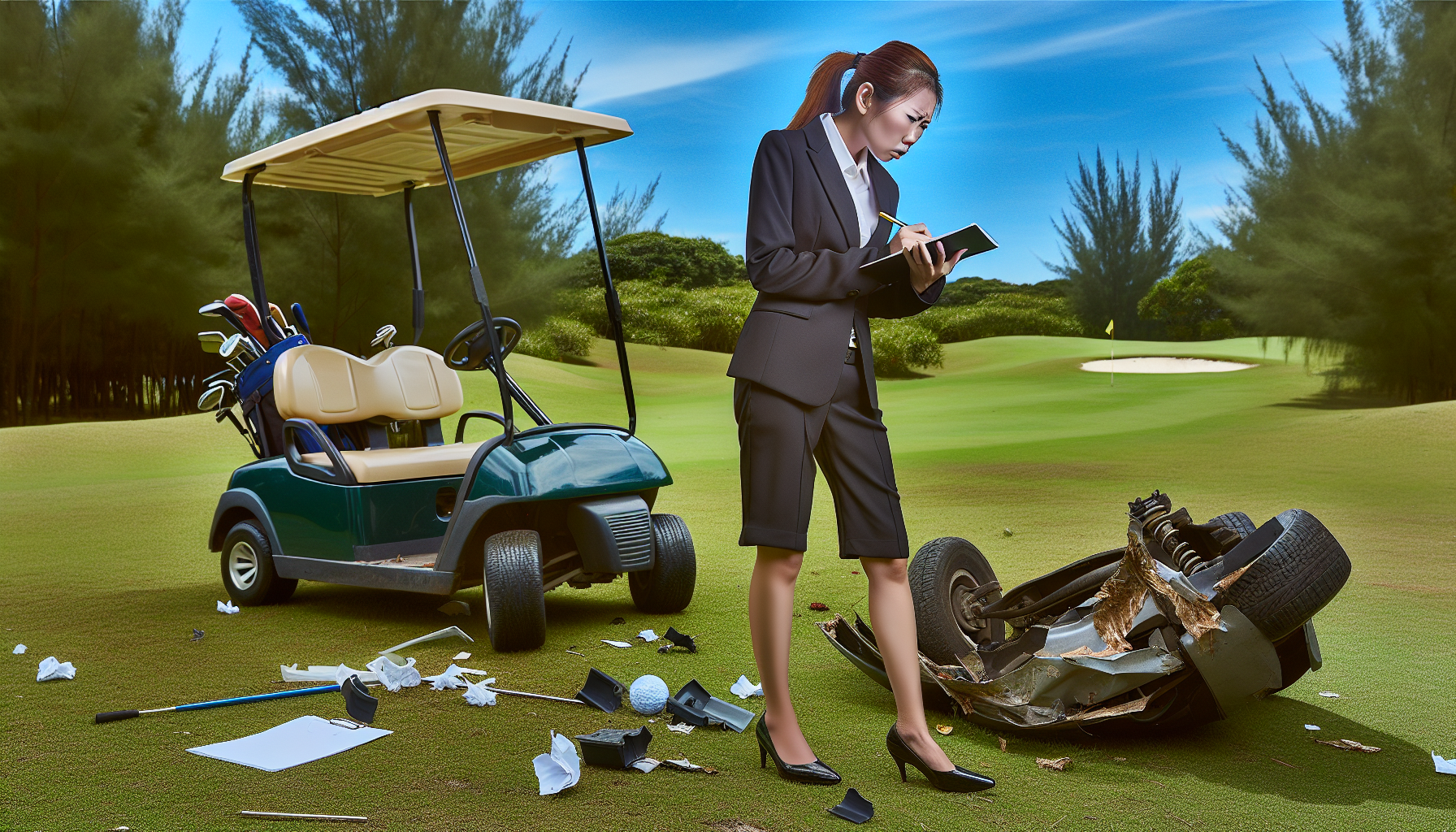
Having discussed the possible causes, injuries, and liabilities related to golf cart accidents, let’s focus on the significant role an attorney can fulfill in these circumstances. They can help build a solid case through gathering evidence, procuring expert testimonies, and negotiating settlements or pursuing litigation.
Whether you are a victim of a golf cart accident or find yourself potentially liable for one, having a golf cart accident attorney by your side can make a significant difference in navigating the legal landscape, protecting your rights, and ensuring fair compensation.
Evidence Collection and Investigation
A major role of an attorney in a golf cart accident case is evidence collection and investigation. This encompasses:
- Obtaining accident reports
- Collecting medical records
- Gathering imagery of the scene
- Collecting witness testimonies
- Seeking expert opinions
This thorough investigation helps to establish the facts of the case, validate claims for insurance coverage, and build a strong argument for compensation. Photos of the golf cart accident, for instance, can effectively depict the incident and bolster the case. Similarly, witness statements offer evidence of eyewitness accounts, aiding in the determination of fault and presentation of the case to insurance.
Expert Testimony
Utilizing expert testimonies is another crucial factor in building a robust injury case. Expert witnesses can provide unbiased views and information to establish liability for damages in a golf cart accident lawsuit, significantly shaping the judge or jury’s comprehension of the incident and injury repercussions, hence influencing the case outcome.
Medical professionals and accident reconstruction specialists can provide compelling insights and objective analysis to support the claims. They can offer expertise on:
- golf cart mechanics or defects
- analyze golf course design issues
- investigate complex scenarios
- offer analysis and testimony to clarify the accident’s dynamics for the court.
Settlement Negotiation and Litigation
The concluding phase of a golf cart accident case typically involves settlement negotiations or litigation. An attorney can liaise with insurance companies to secure a fair settlement, or if required, argue the case in court to ensure proper compensation is awarded.
Settlement negotiations require comprehensive preparation, collection of pertinent information and documentation, and the readiness to engage in bargaining with insurance companies regarding the claim’s worth. If negotiations for a settlement are unsuccessful, an attorney can initiate legal proceedings by filing your case in court to pursue fair compensation.
Summary
In conclusion, golf cart accidents may seem less threatening than traditional automobile accidents, but the potential injuries, legal implications, and significant losses they can cause are just as real. From driver negligence and mechanical failures to hazardous course conditions, several factors can lead to these accidents. Victims can sustain severe injuries, including head and neck injuries, broken bones, and soft tissue damage. Establishing liability involves determining the responsibility of drivers, golf course owners, and manufacturers. An experienced personal injury attorney can provide invaluable assistance, from evidence collection and securing expert testimony to negotiating settlements and litigating in court. It’s clear that understanding the legal landscape of golf cart accidents and having competent legal representation are key to navigating through these troubles on the green.
Frequently Asked Questions
What are the common causes of golf cart accidents?
Golf cart accidents are commonly caused by driver negligence, mechanical failures, and hazardous course conditions. It's important for golf cart users to be aware of these factors to prevent accidents.
What types of injuries can be sustained in a golf cart accident?
In a golf cart accident, injuries can range from head and neck injuries to broken bones, fractures, and soft tissue injuries like sprains and strains. Take precautions to avoid such injuries.
Who can be held liable in a golf cart accident?
In a golf cart accident, liability can fall on the driver for negligence, the florida golf cart accident, course owner for hazardous conditions, and the manufacturers for design flaws or defects in the golf cart. It's crucial to consider these factors when determining responsibility.
How can an attorney help in a golf cart accident case?
An attorney can assist in a golf cart accident case by providing legal guidance, evaluating compensation, negotiating with insurance companies, collecting evidence, securing expert testimony, and litigating insurance claim in court if needed. This can be crucial in helping you navigate the legal complexities and seek appropriate compensation for any injuries sustained.
What is the importance of expert testimony in a golf cart accident case?
Expert testimony in a golf cart accident case is crucial as it provides impartial opinions and information to establish liability for damages, significantly influencing the judge or jury's understanding of the situation and impacting the case's outcome.

